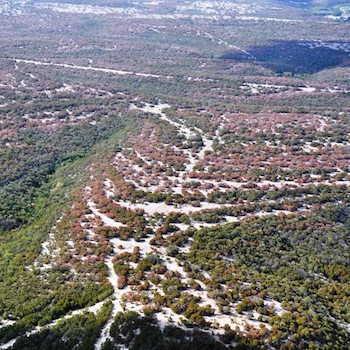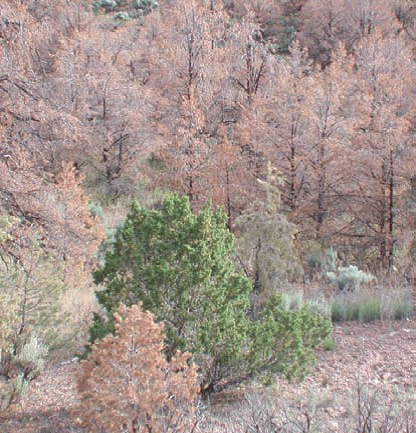Schwinning Lab
Plant Ecology

Tree Mortality
|
Lab News
Evan Simon presented his research at the 2022 TXSER in Austin entitled "The Relationship Between Elevation and Response of Trees of the Edwards Plateau to Drought." He won the first prize for an Oral Presentation by an Undergraduate Student.
A long-awaited Special Feature in the Journal of Ecology has finally been completed. These are our lab's contributions:
Schwinning, S., DeFalco, L.A., Esque, T.C. 2021.What common-garden experiments can tell us about climate responses in plants. Journal of Ecology 110: 986-996 pdf
Custer, N.A., Schwinning, S., Lortie, C.J., Esque, T.C., DeFalco, L.A. 2021. Local climate adaptations in two ubiquitous Mojave Desert shrub species, Ambrosia dumosa and Larrea tridentata. Journal of Ecology 110: 1072-1089. pdf
The following students have received research awards in 2022:
Evan Simons, who conducted research towards an undergraduate honors thesis, was awarded an undergraduate research followship by the College of Science and Engineering. He also won the first prize for the 'Best Undergraduate Oral Presentation' at the TXSER conference (Society for Ecological Restoration, Texas Chapter).
Owen Moorhead won the Ann Miller Gonzalez Graduate Research Grant from the Native Plant Society of Texas (NPSOT) to conduct an experiment in prairie restoration in collaboration with the Native Prairies Association of Texas (NPAT).
Silas Jenkins won the Ann Miller Gonzalez Graduate Research Grant from the Native Plant Society of Texas (NPSOT) to investigate the importance of mycorrhizal fungi for the survival of oak seedlings under drought.
| Susan Schwinning |
| 601 University Drive |
| 312 Supple Science Bldg |
| Texas State University |
| San Marcos, TX 78666, USA |
| Email: schwinn@txstate.edu |
Back to:
 |
 |
Friend websites:
 |
 |
Comments on the contents of this site should be directed to Susan Schwinning

